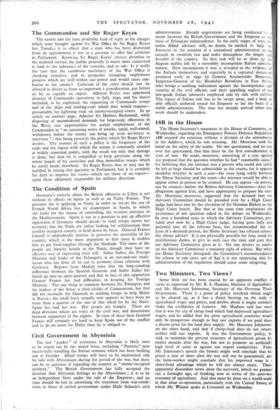18B in the House
The Home Secretary's statement in the House of Commons, on Wednesday, regarding the Emergency Powers Defence Regulation 18B secured the rejection without a division of the amendment to the Address, which he was resisting. Mr. Morrison took his stand on the safety of the realm. No one questioned, and no one ever has questioned, that that must be the first consideration in time of war. He made, moreover, something of a case against the proposal that the question whether he had " reasonable cause," for believing that the internee was a person who could not safely be left at large should be submissible to the courts, for it appears doubtful whether in such a case—the issue lying solely between the Home Secretary and the court—the internee would be able to appear either in person or by counsel. He can appear—in person, not by counsel—before the Birkett Advisory Committee—hear the allegations against him, and have opportunity to prepare his case. Mr. Morrison, moreover, suggested that the demand that the Advisory Committee should be presided over by a High Court judge had been met by the elevation of Sir Norman Birkett to the High Court bench. But that at the same time emphasises the pertinence of one question asked in the debate on Wednesday. In over a hundred cases in which the Advisory Committee, pre- sided over now by a High Court judge, having gone fully and patiently into all the relevant facts, has recommended the re- lease of a detained person, the Home Secretary has refused release. On whose advice? It is not physically possible for him, amid his multifarious duties, to give to each case the time and care that the Advisory Committee gives to it. No one desires to .confer on the Advisory Committee a statutory right of release. But when the Home Secretary disregards the Committee's recommendation for release in 109 cases out of 843 it is not surprising that his administration of the regulation should cause some misgiving.


























 Previous page
Previous page